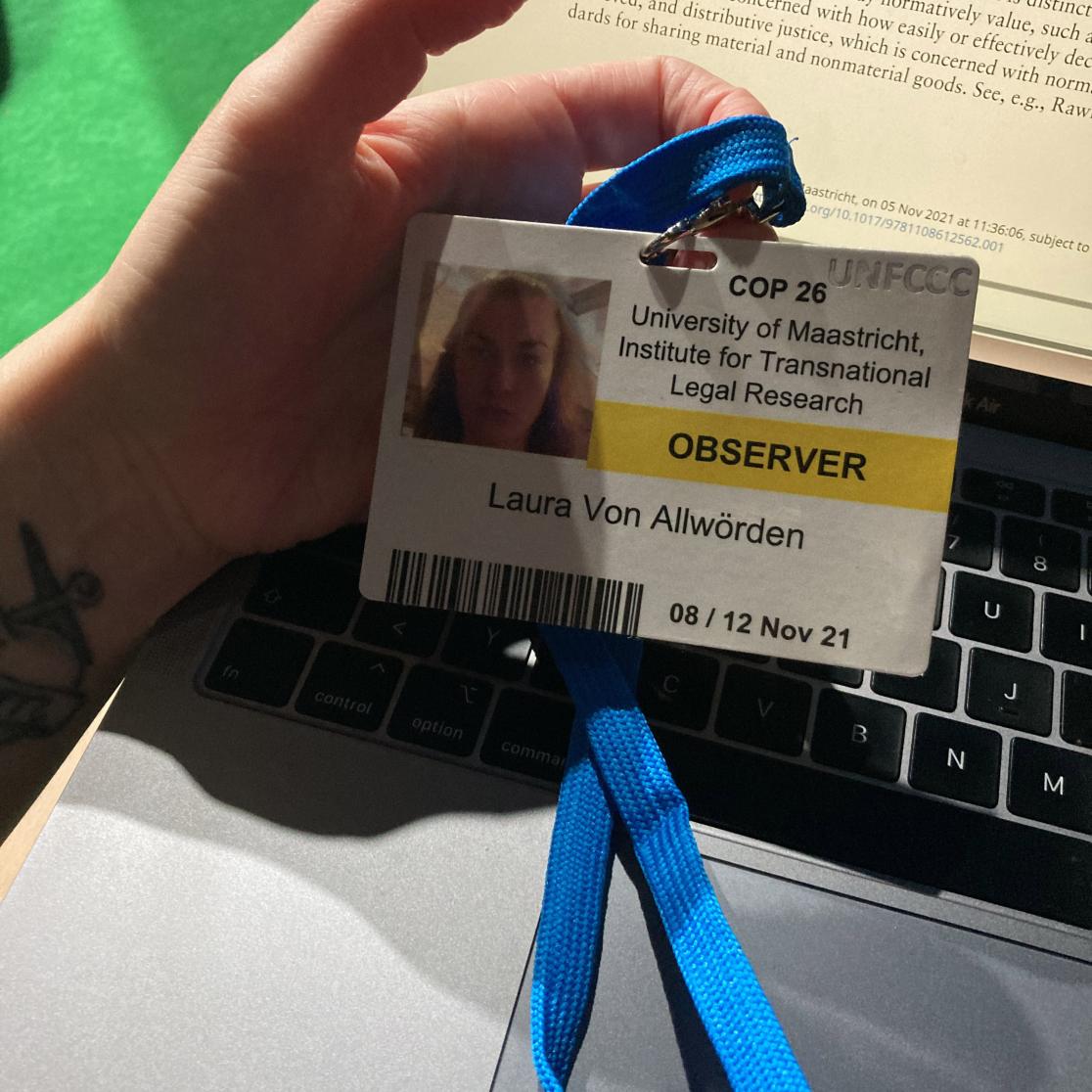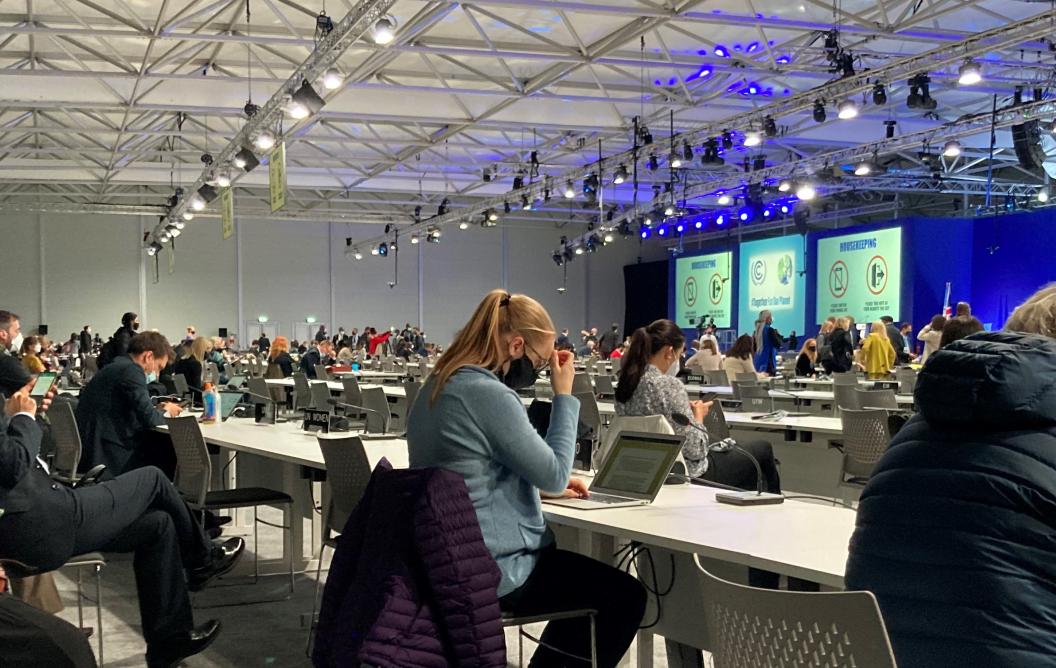Just a COPout?
Laura von Allwörden went to Glasgow to watch the over-caffeinated delegates of the COP26 try to clean the Augean stables that is global multilateral decision-making in order to save the world.
To be surprised by fried food in Glasgow might sound delightfully naïve, but Laura von Allwörden was, after all, visiting the COP26, the 2021 United Nations Climate Change Conference nominally in favour of saving the environment. “I had expected flashy, sustainable hipster food, but it was all a bit greasier than I had thought it would be.”
Von Allwörden is a PhD candidate at the Faculty of Arts and Social Sciences (FASoS) and researches the legitimation, contestation and decline of international organisations, in particular, the United Nations Framework Convention on Climate Change (UNFCCC), who organise the Conference of Parties (COP) and who will have raised an eyebrow or two at her research topic.
“I look at the response to crisis, challenge and contestation. How do those organisations maintain their vitality? Do they become more resilient as a consequence? For example, when President Trump withdrew the US from the Paris Climate Accords, my interviewees told me, everyone was devastated – many feared it would it have a domino effect on Brazil and other countries with populist leaders. It turned out that was not the case, but the WTO for example was more adversely affected by that period.”
Serious cardio
Building on extensive literature research and many previous conversations with UNFCCC members, attending the conference was incredibly useful to Von Allwörden, even though she didn’t get many quotes out of her fieldtrip. “Mostly, no one had time to talk to me – It was very hectic, like the trading floor of the New York stock exchange.”
She describes the trip as akin to an ethnographic study – from which she drew many insights illuminating her previous research. “It felt like I understood all the interviews I had conducted a lot better now that I got the chance to experience a climate conference. It’s a once in a lifetime experience, so I’m very grateful – but it was also incredibly fast-paced and since I hadn’t travelled in two years, a bit overwhelming.”
The field trip certainly was no picnic in the park and the logistics were challenging. “It required lots of planning since I was travelling to a high-risk non-EU country. Also, Glasgow was fully booked, so I stayed in Edinburgh. With the commute, the COVID tests, the security check to get into the venue and everything else, actually getting there and inside took up a lot of my day – it’s serious cardio for everyone involved,” she laughs.
Power play
Amongst the furious flurry of multilateral negotiations, Von Allwörden was intrigued by the bigger picture: “I find power dynamics very interesting. On the one side, you have civil society – or at least an increasingly vocal part thereof – pushing for urgent action and on the other side politicians representing the status quo and moderating any push for change. Even though they say the right things, there is a discrepancy with the actual implementation.”
A contrast also reflected in the discrepancy between the vibrant sense of optimism and urgency she experienced in the pavilion, where representatives of the member states, but also institutions, corporate, NGOs and activist groups engaged in lively discussion, and the higher-level conference where official representatives read out brief statements in carefully worded political language. “No matter the wording of this non-binding agreement, the proof of the pudding is in the implementation.”
Implementation following preceding COPs hasn’t been very promising. “In the end, power lies with the powerful. The decisions made by political leaders are still based a lot on domestic interests and relative international power structures.” Yet, Von Allwörden thinks there is hope: “The political is personal and vice versa. Those decision-makers are all people who want to keep their integrity – and that entails standing – at least to some degree – by their progressive statements.”
Increased focus
Von Allwörden, who studied US power as early as her undergraduate degree, was amused by how star-struck people were by the American A-listers like President Obama and Alexandria Ocasio-Cortez. “When you see the reactions, you can really sense what power is.” At the same time, she was concerned about some celebrity appearances that seemed almost ironic to the occasion. “Jeff Bezos, of all people, was there to speak – how bizarre was that?”
Von Allwörden is not a specialist on the content of the actual agreement, so she can only draw conclusions on the reaction of the organisers. “The overall mood at the end was really quite devastated. They achieved much less than they had hoped for…” What gives her reason for hope, though, is that COP26 received a lot more international media attention than any of its predecessors, which might indicate a shift in public awareness.
Text: Florian Raith

Von Allwörden's observer pass
Also read
-
SBE Researchers Awarded in NWO SGW Open Competition XS
The School of Business and Economics (SBE) at Maastricht University proudly announces that all three research proposals submitted to the latest NWO SGW Open Competition XS have been awarded funding. This exceptional outcome highlights the high calibre of SBE research and its relevance to societal...

-
From Economics to Branding and Innovation: The journey of Patrick van Thiel
Patrick van Thiel’s academic journey began in Rotterdam before he found his true calling at Maastricht University in 1989. Drawn by the Problem-Based Learning (PBL) system, he quickly excelled academically, earning 90 credits in just one year. However, it wasn’t until he discovered his passion for...

-
ICC@M at Maastricht University: competing with the best, shaping the future
Roy Broersma, Academic Director of ICC@M, bridges academia and business, enhancing Maastricht University’s impact. He aims to strengthen regional ties, foster bold ideas, and prepare students for real-world challenges.

